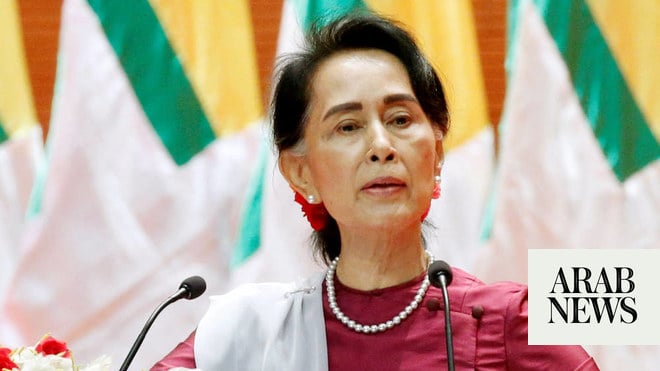
In a surprise announcement, Myanmar’s military leaders this month reduced Aung San Suu Kyi’s prison sentence by six years. Suu Kyi, the former democratically elected civilian leader and Nobel laureate who was ousted by a coup in February 2021, saw her original 33-year sentence trimmed to 27 years. But at the age of 78, the shortened sentence offers little solace to her future prospects. It remains probable that she will pass away during her time in confinement. Thus, one must question the underlying rationale of the Tatmadaw for this gesture.
While the Tatmadaw commands dominion as the sole authority in Myanmar, its overthrow of the civilian government has unfolded in a manner contrary to its initial intentions. Following the coup, Myanmar plunged into a state of active civil strife. Suu Kyi’s National League for Democracy, the former ruling party, has united with other armed factions and ethnic parties to establish the exiled national unity government. Operating under the banner of the People’s Defense Force, a coalition of militias and preexisting insurgent armies, these armed forces are embroiled in a brutal internal conflict that largely remains veiled from global view due to Myanmar’s communication blockade and the risks faced by outsiders attempting to report on the ongoing war.
Consequently, the military is increasingly seeking external recognition and support, primarily from neighboring nations within the Association of Southeast Asian Nations. Criticism has been directed at ASEAN for not leveraging its influence to instigate change in Myanmar. In July, Thai Foreign Minister Don Pramudwinai conducted a discreet visit to Naypyidaw, Myanmar’s capital. The reduction in Suu Kyi’s sentence was positioned as a reciprocal gesture in response to this diplomatic engagement. This strategic move aimed to showcase Thailand’s efforts to engage with the junta and possibly exhibit a modest improvement in the regime’s behavior.
Diplomatic outreach is gradually chipping away at the unified position against the junta held by ASEAN
Dr. Azeem Ibrahim
Nonetheless, this diplomatic outreach is gradually chipping away at the unified position against the junta held by ASEAN. While Myanmar’s neighboring countries in mainland Southeast Asia, including Thailand, Cambodia and Laos, are eager to renew ties with the military leadership despite the junta’s human rights violations, other ASEAN members — Indonesia, Malaysia, the Philippines and Singapore — are displaying an increasing openness to being influenced by these attempts. This trend is exemplified by discussions between the leaders of Malaysia and the Philippines, wherein they considered granting neighboring nations greater flexibility in handling Myanmar’s predicament. This inclination is likely to persist, particularly as Laos, a one-party state backed by its armed forces, prepares to take on the role of ASEAN chair.
China has further bolstered the junta’s pursuit of international acknowledgment. Alarmed by the prospect of Myanmar’s ongoing civil conflict destabilizing its own borders, China"s diplomats have applied pressure on the ethnic armed groups within Myanmar to abstain from aligning with the national unity government.
Despite this support, the junta continues to grapple with maintaining control over significant portions of the country. Demonstrating the challenges, the junta opted to prolong the state of emergency for the fourth time in late July. Furthermore, it deferred a planned sham election scheduled for this month, presumably due to concerns that the vote might backfire and further undermine its authority. Nevertheless, in light of recent diplomatic overtures from Thailand and China, the junta might attain a degree of the international recognition it seeks, even without fully reclaiming its dominance.
Suu Kyi’s future continues to remain ensnared within the confines of imprisonment, with her prospects looking bleak
Dr. Azeem Ibrahim
Despite the intricate diplomatic maneuvers taking place, Suu Kyi’s future continues to remain ensnared within the confines of imprisonment, with her prospects looking bleak. She bears sole responsibility for this predicament. The international perspective on Suu Kyi, once hailed as a champion of democracy and human rights, has shifted and the fervor that once fueled calls for her release has waned considerably. While her popularity endures within Myanmar’s borders, this support has failed to ignite a widespread global campaign advocating for her freedom.
During her year in power, she held the reins as the leader of the civilian government, yet her track record — particularly concerning democratic principles and human rights — was woefully disappointing. During her tenure, she seemed to forsake the very values that we once associated with her. Her most glaring lapse lay in her defense of the Myanmar military’s atrocities against the Rohingya, amounting to a grave humanitarian crisis. The National League for Democracy, her political party, was complicit in the disenfranchisement of nearly all remaining Rohingya ahead of the last general election.
Despite certain clashes with the military over state control, the party failed to genuinely pave the way for democratic growth within both the government and society at large. Instead, the focus primarily revolved around centralizing power, extracted from the military, into the hands of Suu Kyi. This approach partly stemmed from her inability to tolerate criticism and dissent, as well as her lack of foresight in cultivating a sustainable democracy that could extend beyond her own tenure.
Though her popularity among some of Myanmar’s populace endures for now, the prospect of lifelong imprisonment seems a certainty. While Suu Kyi’s political relevance on paper remains, her ability to lead or inspire the people of Myanmar toward any political goal will gradually fade if her confinement is not significantly reduced.
Dr. Azeem Ibrahim is director of special initiatives at the New Lines Institute for Strategy and Policy in Washington, D.C., and the author of “The Rohingyas: Inside Myanmar’s Genocide” (Hurst, 2017). Twitter: @AzeemIbrahim












